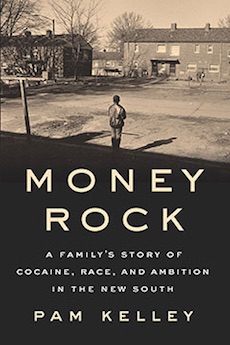By Louis J. Kern
Pam Kelley, former reporter for the Charlotte Observer, first wrote about the protagonist of this story of three generations of African American men enmeshed in the world of cocaine and crack dealing in an article on the shootout between the posses of Money Rock (Belton Lamont Platt) and Big Lou (Louis Samuels) on November 30, 1985, in the public housing project of Piedmont Courts. Charlotte, North Carolina, by 1970 was the fifth most racially segregated city in the U.S., and by the 1980s Piedmont Courts had become a prime location of the cocaine trade.
Kelley traces the arc of Platt’s life from his days as a Boy Scout to his withdrawal from high school to his rise to legendary status as a drug dealer, his conviction to a twenty-year-plus prison term, his embrace of religion, and his ultimate redemption. Initiated into cocaine sales by his father, Alphonso, two of his sons subsequently died in the trade. Money Rock saw himself as an entrepreneur meeting a public need; he took pride in the purity of his product but opposed drug use and scrupulously abstained himself; his generosity was well known in the community. His descent into ghetto crime, his reclamation of respectability, and his effective self-re-constitution as an evangelical minister broadly parallels the career of Shawn Corey Carter (Jay-Z), absent the glitz and glamour.
In Kelley’s hands, the saga of Money Rock is used to personalize the broader social, economic, residential, legal, and juridical restrictions that segregation and institutionalized racism have imposed on underprivileged African Americans both in the New South and in the nation at large. She effectively situates him within an extensive kinship network and the broader Black community as well as contextualizing his story in the collective history of the region and the nation as a whole, providing depth and complexity to the narrative.
Money Rock is a testimony to misguided and failed policies—urban renewal, the War on Drugs, the Anti-Drug Abuse Act (1988), maximum drug sentences, the rise of for-profit prisons—that have reinforced and reproduced the conditions of lack of opportunity and mobility grounded in pervasive racism that have plagued the African American poor. Ironically, Charlotte was an integrated city from Reconstruction to 1900 when the state White Supremacy Campaign re-imposed segregation. Residential segregation guaranteed school segregation until overturned in the 1970s in accord with the verdict of Swann v. Charlotte-Mecklenburg Board of Education.
In 1999 a federal ruling ended busing in Charlotte schools, so residential segregation guaranteed renewal of school segregation. Poverty and crime flourished in the projects; while Blacks were 28% of county population they comprised 70% of felony arrests .Nationally, with mass incarceration, there were more Black men in prison in 2010 than were enslaved in 1850. The possibility for social mobility in Charlotte ranked last in the nation.
Confuting this abiding, unacknowledged racism, Kelley’s consideration of Money Rock is compassionate and empathetic. Imprisoned for twenty-two years, Platt earned a junior college degree. Through intense biblical study and prayer, and the guidance of a fellow inmate, Jim List, he was ordained and experienced a personal god who led him to evangelize against the life of the drug “hustle.” Upon release he embodied his regeneration in the foundation of the Rock International Ministry and worked for the betterment of his community.
Overall, Kelley gives us a very human story of the way racism can stunt and deform a life, and yet hope is resurgent in the spirit. As we close the book we can almost hear Belton Platt softly rapping Tupac’s words: “God ain’t finished with me yet. [There’s] a path for me.” (“Ghetto Gospel”).
Louis J. Kern (ΦBK, Clark University) is professor emeritus of history at Hofstra University. Hofstra University is home to the Omega of New York chapter of Phi Beta Kappa.




